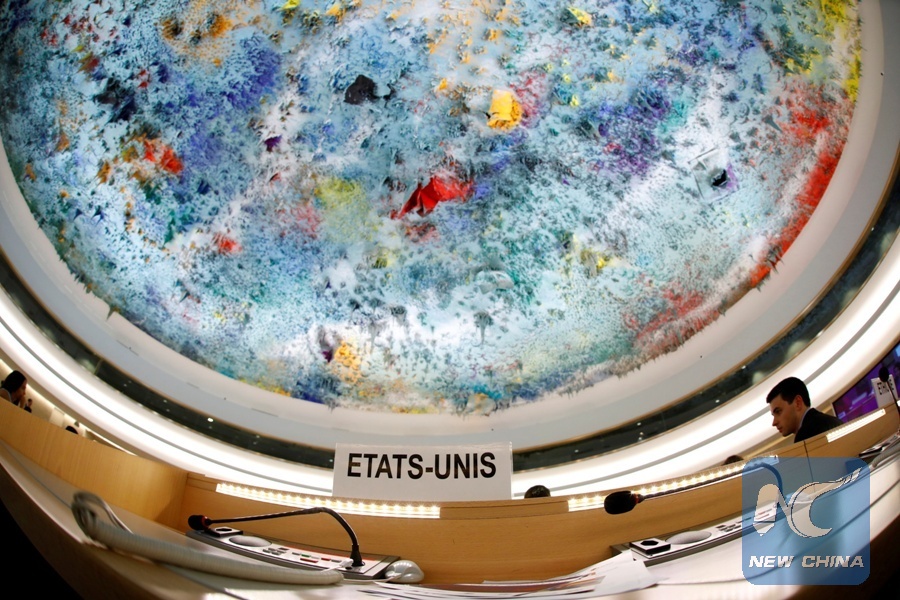
The name place sign of the United States is pictured one day after the U.S. announced their withdrawal during a session of the Human Rights Council at the United Nations in Geneva, Switzerland June 20, 2018. (Xinhua/REUTERS)
by Xinhua writers Zhu Dongyang, Liu Chen
WASHINGTON, June 19 (Xinhua) -- The United States announced on Tuesday its withdrawal from the United Nations Human Rights Council, in the latest move of unilateralism featuring reckless hubris on human rights issues.
On the motivation behind the decision, U.S. Permanent Representative to the United Nations Nikki Haley cited the UN human rights body's disappointing reform process, the alleged disqualification of some members, U.S. lack of support from other like-minded nations, and the council's "disproportionate focus and unending hostility towards Israel."
Unlisted reasons, however, may include the UN leaders' criticism of the U.S. recent separation of some 2,000 children from their illegal immigrant parents, and the U.S. reluctance to pay for UN membership fees that the Trump administration believes have not brought back enough reimbursement on some domestic and international issues.
The withdrawal once again highlights Washington's disregard of the UN's authority and objectives. Its appetite for setting deadlines for multilateral consultations and threatening to exit them have, unsurprisingly, met with cold shoulders even among its allies.
Also unsurprising is the Trump administration's neglect of the mounting domestic hostility to ethnic minorities like Muslims and Mexicans, and specifically disregard of their human rights.
What have been beyond apprehension, however, are the U.S. tactics to pressure reform of an organization or treaty by leaving it, to promote human rights by attacking others without self-reflection, and to endorse double standards when a human rights issue goes against its own interests.
The withdrawal is also indicative of the role of human rights issues in Washington's eyes -- tools used for political purposes. Its performances on domestic and foreign policies have once again undercut the so-called universal values and international norms that it has vowed to defend.
Besides the UN Human Rights Council, the Trump administration, since its inauguration, has quitted the Paris climate accord, the UN global compact on migration, the UN cultural and educational body UNESCO, as well as the Iran nuclear deal. Neither did it shy away from confronting nations, friends or foes, on sensitive issues like the status of Jerusalem, and trade tariffs.
Behind these moves has been an assumed U.S. victimhood, a belief that U.S. interests have long been undermined by others, and therefore Washington should spare no efforts to remedy it.
The U.S. unilateralism, nevertheless, has so far failed to bring benefits to U.S. citizens. Besides a worldwide slumping confidence in its moral image, the United States is also facing drifting allies, resentful neighbors, more bloodshed and conflicts in the Middle East, and looming trade wars to engulf the whole world.
The world has grown impatient about the U.S. appeals and approaches. Palestine has clearly stated its rejection of the U.S. plan for its relations with Israel; Germany has refused to reach the defense-sharing threshold before the U.S.-set deadline, and Iran has threatened to increase its uranium enrichment level.
After Washington began to brandish its "big stick" of tariffs, the European Union members, Canada, Mexico, China, among others, have announced retaliatory measures.
Perhaps only more failures could make Washington realize that zero-sum mentality and unilateralism will not help achieve its goals, whatever they may be.

